Reading, Writing and Talking in Reading
I was flattered, though not at all surprised, to hear that the Dead Funny event so elegantly chaired by Mr Peter Guttridge was one of the most successful events at last year’s Reading Festival of Crime Writing.
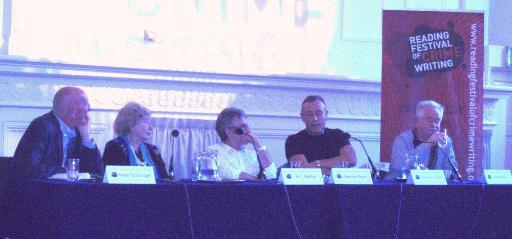
Now in its fourth year, the Festival has sensibly moved from September to November to avoid clashing with Bouchercon in America and will this year take place from the 10th to the 13th, featuring such notables as Martina Cole, Denise Mina, local author Will Carver, the prolific Adrian Magson, Natasha Cooper, bookseller David Headley and, of course, Professor Barry Forshaw.
More than most other crime festivals, Reading covers criminal history and true crime writing just as much as crime fiction and full details of the programme can be found at www.readingfestivalofcrimewriting.org.uk.
I, naturally, have offered my support and will be playing the part of Sue Lawley when Minette Walters names the ten or more discs (politicians, books, films and just about anything else) which would make her life a misery if stranded with them on a remote tropical island. This particular intellectual extravaganza is entitled Desert Island Hell and takes place on Sunday 13th November.

| |
|
Rationing, Austerity and Fine Writing
You can wait for years to find a decent historical thriller set in the icy smog of post-war London which mentions jazz legend Art Tatum, and then two come along at once!
 For legal reasons I have only just got to read John Lawton’s superb novel A Lily of the Field, which was published in the US last year and by Grove Press in the UK in May. For legal reasons I have only just got to read John Lawton’s superb novel A Lily of the Field, which was published in the US last year and by Grove Press in the UK in May.
If you haven’t yet encountered Lawton’s ‘backwards’ series of novels (so called because of the order in which they appeared) featuring the Troy family, and in particular Scotland Yard detective Frederick Troy, which began I believe with Black Out in 1995, then all I can say is: where the hell have you been?
In Lily of the Field, a complex back story is established in Vienna in 1934, an internment camp on the Isle of Man in 1940 (familiar territory for Lawton fans), Auschwitz in 1944 and Paris in 1946, with side-bars into the Manhatten Project in America, before we come to the dull, cold., grey of 1948 Austerity London and Frederick Troy enters the plot, which involves music, musicians, a shooting on the London Underground with a pistol made by Fabergé, the leaking of atomic secrets, loyalty to the Communist party, a jovial local prostitute and some scary Czech hitmen – oh, and Art Tatum (in passing).
As always, Lawton’s research and use of it is pitch perfect and the book is positively stuffed with not only credible, but believable characters (even an alcoholic one-legged accountant!), including a cameo role for gunsmith Robert Churchill. There are also three affectionate references to the detective stories of Dorothy L. Sayers and indeed the “McGuffin” of the plot (or at least the espionage portion) is a method of sending coded messages which you could imagine Dorothy herself would have been proud of.
Despite the international dimensions and a large cast of mittel-European characters, this is Lawton doing what he does best: looking at the British and British sensibilities (or lack of them) with a wonderfully jaundiced eye and a wicked sense of humour, making this one of the most satisfying 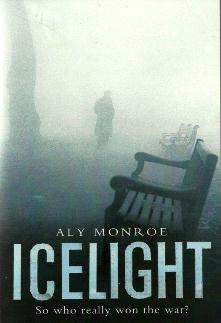 historical novels I have read in a long time. historical novels I have read in a long time.
Set in 1947 London, during the bleakest winter for decades, Icelight by Aly Monroe, from the jolly magnificent John Murray, puts her innocent but resourceful young hero Peter Cotton into the super-cold world of politics, inter-agency rivalry and homophobic witch-hunts.
Seconded from economic intelligence (Monroe is the only spy fiction writer I know who can make economics thrilling), Peter Cotton joins Operation Sea-snake, which seems to be sanctioned by both MI5 and MI6, though no-one seems quite sure, and involves Cotton becoming in no particular order go-between, investigator and protector for a large cast of dodgy MPs, corrupt (or corruptible) policemen, Glasgow razor boys, homosexuals, atomic scientists and minor theatricals. Oh, and Art Tatum (sort of).
Once again, Monroe’s research is spot on and she paints her supporting cast with so many shades of grey that it makes a John Le Carré novel look positively straightforward. This is wonderfully atmospheric, if chilling stuff; so chilling it makes you want to turn on that forbidden second bar on your electric fire.
|
|
Little Tinker
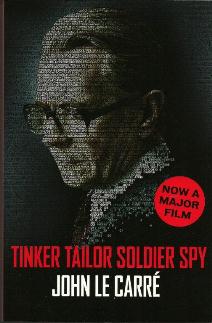 |
And speaking of John Le Carré, I must mention that a new, film tie-in edition of his classic Tinker, Tailor, Soldier, Spy is now out in a splendid new paperback from Sphere.
As it is a film tie-in edition, the more astute of my readers will have deduced that a new film version is about to hit the cinemas later this month. Were I to say anything about the film, or even hint that I had seen an exclusive preview, I would of course have to kill you. Suffice it to say for now that I am sure you will enjoy it.
|
|
|
Danegeld
Not since England was ruled by those merry monarchs Sweyn Forkbeard, Cnut, Harold Harefoot and Harthacnut, or since Sandi Toskvig took over Radio 4’s The News Quiz, have Danes been so popular among the chattering classes.
Hardly had the after-dinner mints been cleared away and the gossips finished drooling over the BBC’s showing of the Danish series Forbrydelsen, than the American re-make, The Killing, cames to the small screen. Naturally, the chattering classes expected, indeed hoped, this would be a vulgar and crudely commercial version suitable for some lofty scoffing, but so far the sceptics seem to have been disappointed for the Seattle-set murder mystery is really rather good and building a fair following.
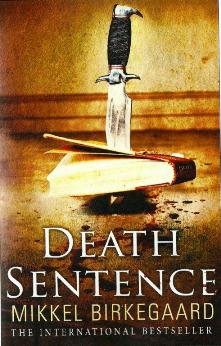 This month expect quite a stir over the new novel Death Sentence from Black Swan, by Copenhagen-based Mikkel Birkegaard and not just because of its often gruesome violence (those of a nervous disposition are warned now about the last chapter), but because it is relentlessly gripping and very clever, posing some distinctly unpalatable questions about the massive egos – and sanity - of writers.
Frank Føns started out as precocious punk writer challenging the literary establishment, but finds fame and fortune as a crime writer who plots intricate and fantastical murder scenarios. But success doesn’t seem to sit well with Føns, who loses his wife and daughter and becomes increasingly isolated from the real world, helped in no small way by copious amounts of strong drink and other substances. And then the murders begin, all copying in exact detail the fictional murders so meticulously described in his fiction – even in a new book yet to make it to the bookshops. Is Føns the writer being framed? Is the motive behind the elaborate murders revenge, jealousy, retribution or atonement? Or is Føns simply going bonkers?
Don’t expect a neat, logical solution, but if you’ve the stomach for it, this is a runaway train of a book which exposes the darker, egotistical side of crime writing whilst, at the same time, being constructed with the pace and tension of the very best crime thriller.
I am sure – well, almost sure – that crime writers in the main are not at all like the fictional writer created by Mikkel Birkegaard; some are polite and well-behaved in mixed company, many have been known to read a book by another writer and some (they know who they are) actually claim never to drink alcohol. I was, however, told of a crime-writer at a recent literary festival who was overhead to say, disparagingly with a very loud theatrical sigh, to two other writers that they had to excuse him as he had “to go and do that fan stuff” at a signing session.
Unfortunately, he was overheard by some of those very “fans” waiting patiently for him to do “stuff” for them. I suspect that the queue to have books signed became shorter than it might have been. This month expect quite a stir over the new novel Death Sentence from Black Swan, by Copenhagen-based Mikkel Birkegaard and not just because of its often gruesome violence (those of a nervous disposition are warned now about the last chapter), but because it is relentlessly gripping and very clever, posing some distinctly unpalatable questions about the massive egos – and sanity - of writers.
Frank Føns started out as precocious punk writer challenging the literary establishment, but finds fame and fortune as a crime writer who plots intricate and fantastical murder scenarios. But success doesn’t seem to sit well with Føns, who loses his wife and daughter and becomes increasingly isolated from the real world, helped in no small way by copious amounts of strong drink and other substances. And then the murders begin, all copying in exact detail the fictional murders so meticulously described in his fiction – even in a new book yet to make it to the bookshops. Is Føns the writer being framed? Is the motive behind the elaborate murders revenge, jealousy, retribution or atonement? Or is Føns simply going bonkers?
Don’t expect a neat, logical solution, but if you’ve the stomach for it, this is a runaway train of a book which exposes the darker, egotistical side of crime writing whilst, at the same time, being constructed with the pace and tension of the very best crime thriller.
I am sure – well, almost sure – that crime writers in the main are not at all like the fictional writer created by Mikkel Birkegaard; some are polite and well-behaved in mixed company, many have been known to read a book by another writer and some (they know who they are) actually claim never to drink alcohol. I was, however, told of a crime-writer at a recent literary festival who was overhead to say, disparagingly with a very loud theatrical sigh, to two other writers that they had to excuse him as he had “to go and do that fan stuff” at a signing session.
Unfortunately, he was overheard by some of those very “fans” waiting patiently for him to do “stuff” for them. I suspect that the queue to have books signed became shorter than it might have been.
|
|
Bad Tippers
Oddly enough, there were no Danes on the shortlist for the latest Crime Writers’ International Dagger, sometimes called the Dagger in Translation and which, for reasons which entirely escape me, is awarded for books published between June of one year and May the next. And once again, readers of the interweb site Eurocrime showed they were just as bad as I am in trying to second-guess the conclusions of the distinguished judges.
In their annual poll of readers asking them who they wanted to win the International Dagger, some 82% of Eurocrime’s enthusiastic “blogees” (if that’s a word) voted for books other than the eventual winner, Three Seconds by Swedish pair Roslund-Hellstrom which, for legal reasons, I know nothing of.
The most popular book in the poll was Fred Vargas’ An Uncertain Place, with Andrea Camillieri’s Wings of the Sphinx coming second and the actual Swedish winner third, with 18% of the votes.
I need hardly add that my personal favourite crime novel in translation, Domingo Villar’s Death on a Gallician Shore, came last in the poll of Eurocrime voters and, apparently, also in the opinion of the judges, distinguished though they may be.
Those other CWA Daggers – Gold for crime and Steel for thrillers – will be decided later this year, as and when the ITV3 schedule allows, though the shortlists are now public. Strangely, I can see no mention on those shortlists of anything by Reginald Hill, Martin Cruz Smith, Michael Connelly, Kate Atkinson, John Le Carre or Roger Smith, who all produced outstanding books in the period. Neither was there room for Canadian Louise Penny’s Bury Your Dead, which seems to pick up an award every week on the other side of the Atlantic these days.
But what do I know?
|
|
Like Buses
I don’t mean to sound callous, but one can go for years without hearing a reference to the assassination of King Alexander of Yugoslavia in Marseilles in 1934 (the first political assassination caught “live” as it were by newsreel cameras) and then three of them come along almost at once. I have already noted that Mark Mills and Thomas H. Cook both refer to the event in the course of their excellent new novels House of the Hanged and The Quest for Anna Klein, but so too did Alan Furst in his novel Kingdom of Shadows in 2000, although I have only just – shamefully – got around to reading it.
 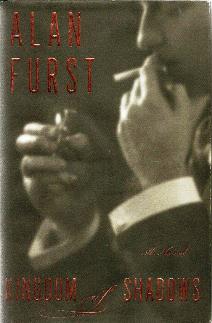
I cannot understand why Alan Furst is not better known in this country for despite being American, he writes wonderfully stylish and intelligent historical thrillers, usually set in the 1930s and ’40s and in parts of central and south-east Europe not featured in spy fiction since the heydays of Graham Greene and Eric Ambler. Quite why Furst has not won an award for any of his eleven “Night Soldiers” books over the last twenty years simply beggars belief.
Perhaps I have been recommending him too loudly and the Curse of the Ripster has descended on him. I do hope not, but just in case, I will bite my tongue and blunt my quill having heard that Furst has a new novel, The Spies of Paris, on the stocks though sadly it will not be published here until June 2012.
|
|
Surf’s Up
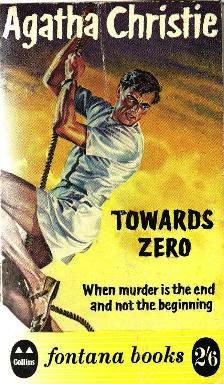
Now be honest. Which piece of iconic music ran through your mind when you saw this vintage (if slightly camp) cover from a classic Agatha Christie mystery? I’ll bet anything it wasn’t the famous theme to Hawaii Five-0. You know: ta da da da daah da, ta da da da dah.....
Well it is now, following revelations in the Daily Telegraph (so it must be true) that one of the early British pioneers of surfing in the 1920’s, whilst on holidays in South Africa and Honolulu, was none other than Dame Agatha Christie and there is photographic evidence to prove it (as well as the fact that she actually mentioned it in her autobiography).
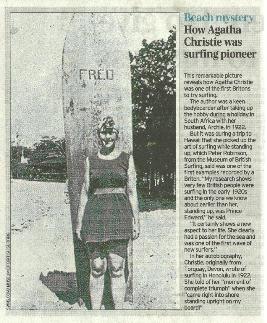
I for one am delighted to learn that Dame Agatha was not clucked about mullering an ankle buster or a cutback and could break a line or roll an Eskimo with the best surfer dudes around. (And I have no idea what any of that means.)
|
|
A Cinema Near You
As is well known, I am a long-standing fan of crime fiction in translation, particularly when “translated” from 7th century Chinese into Dutch and then English, as in the famous “Judge Dee” books by Robert van Gulik (1910-1967).
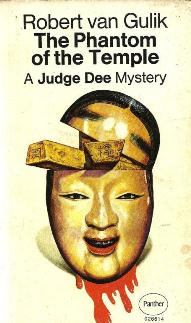 Some of my more mature readers may fondly remember the television adaptations from the days of black-and-white film and creaky studio sets, but now it seems Judge Dee has hit the big screen in a Chinese film of the kung-fu “kick-ass” school called Detective Dee and the Mystery of the Phantom Flame. The ‘Detective Dee’ of the title is, as I understand it, based on the legendary Chinese hero Di Renjie, who became the philosophical Judge Dee of van Gulik’s books in which I do not believe he actually kicked a single ass.
And another all-action, if not hyperactive, film will be coming to a cinema near you soon. Haywire, which boasts an impressive cast including Ewan MacGregor, Michael Douglas and Antonio Banderas, is mostly about a female ‘black ops’ agent called Mallory Kane, who is described in the film’s publicity as an “ass-kickitrix”.
This is a term I had not come across before, but will now use mercilessly at every opportunity, although I cannot say the same for another piece of modern slang which had been revealed to me.
A fresh-faced young publicist at a major publishing house recently assured me that he could easily teach me how to “tap and sweep an app” but I declined his offer for I knew of what he spoke, having made, in my youth, something of a purely academic study of that almost forgotten classical language Polari. Some of my more mature readers may fondly remember the television adaptations from the days of black-and-white film and creaky studio sets, but now it seems Judge Dee has hit the big screen in a Chinese film of the kung-fu “kick-ass” school called Detective Dee and the Mystery of the Phantom Flame. The ‘Detective Dee’ of the title is, as I understand it, based on the legendary Chinese hero Di Renjie, who became the philosophical Judge Dee of van Gulik’s books in which I do not believe he actually kicked a single ass.
And another all-action, if not hyperactive, film will be coming to a cinema near you soon. Haywire, which boasts an impressive cast including Ewan MacGregor, Michael Douglas and Antonio Banderas, is mostly about a female ‘black ops’ agent called Mallory Kane, who is described in the film’s publicity as an “ass-kickitrix”.
This is a term I had not come across before, but will now use mercilessly at every opportunity, although I cannot say the same for another piece of modern slang which had been revealed to me.
A fresh-faced young publicist at a major publishing house recently assured me that he could easily teach me how to “tap and sweep an app” but I declined his offer for I knew of what he spoke, having made, in my youth, something of a purely academic study of that almost forgotten classical language Polari.
|
|
Gone but not Forgotten
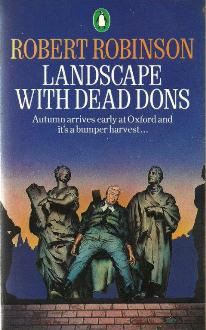 It was sad to note the death of Robert Robinson last month at the unreasonably young age of 83. For many in Britain he will be remembered most for his chairmanship of various television and radio quiz shows, but he was also an intelligent and influential journalist and critic. The discerning few will, of course, remember him for his one and only detective novel, written whilst still in his twenties, Landscape With Dead Dons. It was sad to note the death of Robert Robinson last month at the unreasonably young age of 83. For many in Britain he will be remembered most for his chairmanship of various television and radio quiz shows, but he was also an intelligent and influential journalist and critic. The discerning few will, of course, remember him for his one and only detective novel, written whilst still in his twenties, Landscape With Dead Dons.
Set in Oxford and with its tongue firmly in its cheek, Landscape is a fine example of what were once called ‘Donnish Detective Stories’ and centres on the bizarrely-staged death of a Vice-Chancellor, a missing Milton manuscript and the discovery of a previously unknown poem by Geoffrey Chaucer. It’s witty, smart and delightfully entertaining and a real classic as it is one of the few (if not the only) ‘whodunits’ which tells you who done it before page 1! If you know where to look, that is.
|
|
|
|
Literary Lunch

I am always happy to help out my writer – and publisher – friends when needs must and so am delighted that a recent buffet created by the chefs here at Ripster Hall for one of my legendary candlelit literary lunches was thought not only photogenic but suitable to be used on the cover of the fabulous new John Rawlings mystery Death at the Wedding Feast, published by those most civilised of publishers, Severn House.
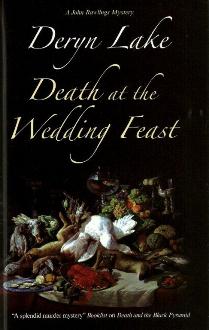 I do not have to remind my discerning readers that the apothecary John Rawling is the creation of that Queen of the Georgian Mystery, Deryn Lake and in his latest adventure he is in Devon, staying, naturally, at the finest houses in the county. Also naturally, scandal and mystery follow him around to call on his not insignificant skills as a detective. This time the scandal is sparked by the impending marriage of the young daughter of Rawling’s society hostess to the Earl of St Austell, who just happens to be 52 years her senior in age. I do not have to remind my discerning readers that the apothecary John Rawling is the creation of that Queen of the Georgian Mystery, Deryn Lake and in his latest adventure he is in Devon, staying, naturally, at the finest houses in the county. Also naturally, scandal and mystery follow him around to call on his not insignificant skills as a detective. This time the scandal is sparked by the impending marriage of the young daughter of Rawling’s society hostess to the Earl of St Austell, who just happens to be 52 years her senior in age.
I have no idea why such an age difference between a young lady and a mature gentleman of means should be a cause for concern. Some kill-joys will undoubtedly point out that the half-century age gap may give rise to problems in the physical side of the marriage, but I say let the couple take their chances and if she dies, she dies.
|
|
From Enzed
As a judge for the second Ngaio Marsh Award this year, I was happy to play a very small part in promoting the crime fiction of New Zealand, or ‘Enzed’ as those in the know call it (formerly ‘Middle Earth’).
From a strong and very impressive shortlist, the international jury of judges gave the award to Paul Cleave for his violent urban revenge tale set in Christchurch, Blood Men.
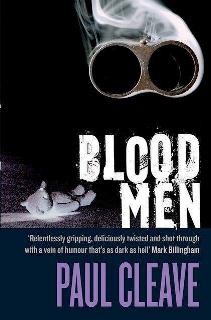
Sadly, I do not think that Blood Men has a UK publisher yet (even though Cleave is a bestseller in several European countries), but one other ‘Enzed’-based author –and candidate for the Ngaio Award – certainly does.

After numerous dark, stand-alone thrillers all set in the UK, Neil Cross, with Luther: The Calling from Simon & Schuster, puts into novel form his most famous creation for television, the unconventional London copper John Luther. Oddly enough, the new book and the accompanying press release make no mention of the fact that Cross lives in New Zealand where he is feted as an important part of the burgeoning Kiwi Crime scene.
|
|
Flippin’ Heck
It has taken the finest minds many years to develop a small, handy-sized electronic “reader” to replace the traditional small, handy-sized paperback book, but it has only taken the publishing industry a matter of months to develop a printed hardback book as small, handy and – dare one say – fashionable as a Kindle e-reader, or whatever they are called.

I was first shown one of these ‘Flipbacks’ some months ago as a top secret prototype and failed to take on the significance of the development. (As someone who only reads – or has read aloud by a liveried flunkey – hardback books chained to a lectern, I was probably not a representative sample of consumer opinion.) This month, six “bestsellers” will appear as Flipbooks from Hodder, all priced at £9.99, and among them will be Bad Men by Irishman John Connolly, which I remember reading and liking when it came out in 2003 – in fact, I still have the promotional t-shirt. The book was notable for a superb central character, a giant Maine policeman known as Melancholy Joe Dupree, who was such a marvellous creation, that I cannot think for the life of me why he has not featured in a sequel.
For those of a technical bent, the Flipbook measures 7.5” x 4.8” when opened for reading the exact dimensions of a Kindle reader and it actually weighs less and doesn’t need batteries. The pages, as you might have gathered, flip up rather than turn from right to left.
|
|
The New Creasey?
One of the founders of the Crime Writers’ Association, back in the 1950s, was John Creasey. Today, few if any of the 600 novels he wrote (yes, six hundred) are in print - although a good handful have recently appeared as Kindle e-books - his name has been forgotten in bookshops and dropped from the CWA’s award for a debut crime novel.
Whether Creasey actually did pen over 600 titles, I do not think anyone – including Creasey – is absolutely certain, but he certainly did produce an extraordinary number of titles over a 40-year career and he was an undoubted influence on British crime writing and indeed on the development of detective series on television.
I had always thought Creasey’s record output would remain just that, a record. But now I’m not too sure.
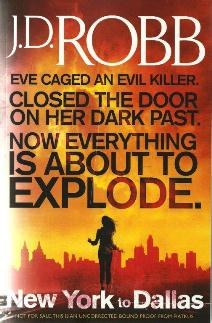 This month Piatkus publish the 33rd Eve Dallas thriller, New York to Dallas by the prolific American Nora Roberts, writing as J.D. Robb. Now 33 titles in a series might sound impressive (it certainly should) but not necessarily record-breaking, until, that is, you realise that J.D. Robb created Eve Dallas only 16 years ago (do the math) in 1995 and, as Nora Roberts, has in addition, written by my count 167 other novels and perhaps two dozen novellas. This month Piatkus publish the 33rd Eve Dallas thriller, New York to Dallas by the prolific American Nora Roberts, writing as J.D. Robb. Now 33 titles in a series might sound impressive (it certainly should) but not necessarily record-breaking, until, that is, you realise that J.D. Robb created Eve Dallas only 16 years ago (do the math) in 1995 and, as Nora Roberts, has in addition, written by my count 167 other novels and perhaps two dozen novellas.
So I have no hesitation in tipping Nora Roberts/J.D.Robb as ‘the new Creasey’ as I reckon she’s produced well over 200 novels (she also writes under other names) since first published 30 years ago in 1981. And as she seems to have no intention of slowing down, could easily double her output in the next thirty years. In fact, I hear she has another novel out in October and yet another in February 2012.
|
|
The Italian Job(s)
Whilst many crime fans and ladies of a certain disposition (disposition in question: still breathing) continue to suffer withdrawal symptoms from the BBC’s ridiculous decision to cancel Zen, some comfort can be taken from the continued popularity of Italy as a setting for intelligent mystery stories.
Already published by Mantle is The Lost Daughter by American Lucia Grindle, which has the spectacular back-drop of Ferrara, Rome and Florence, cutting between the 1970’s and the present day.
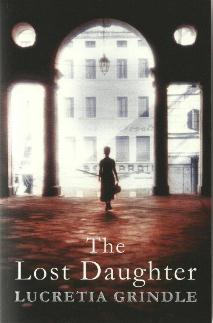 
Next month the action moves to Bari in another legal thriller by Gianrico Carofiglio, Temporary Perfections, from the always-interesting Bitter Lemon Press. To be more accurate, I suspect the real action will take place on London’s Charing Cross Road, as the devilishly handsome Gianrico makes an appearance at Foyle’s Bookshop there on Monday 26th September, which I am sure will be packed with his fans and a large number of ladies seeking closure after having Rufus Sewell snatched from their television screens.
|
|
Spy The Beloved Country
I am steeling myself for this month’s inevitable hysteria as publishers and booksellers trumpet that “South Africa is the new Scandinavia” when it comes to crime writing and that Deon Meyer is “South Africa’s Answer to Stieg Larsson”. He’s not; he’s far better.
Behind the hysteria is the almost simultaneous publication of new novels by two of South Africa’s crime fiction big beasts and I will join in the hysteria – nay take to the streets in an act of riot – if it helps promote them, for they are both fantastic thrillers.
Firstly, Deon Meyer’s Trackers, translated from the Afrikaans (where I think the title was the rather impressive Spoor) is published here by those modest and unassuming publishers Hodder & Stoughton, who have kept Meyer’s light under a bushel for far too long. (Which is a reviewer’s way of saying it took me a long time to discover him.)
I raved last year about his ensemble policier 13 Hours, which was eligible for at least three crime fiction awards yet won nothing, and compared Meyer’s writing and in particular his grasp of pacing and plotting, to that of Michael Connelly. With Trackers I would suggest he has moved into the John le Carré class, and not simply because one of the plot lines is about the workings of a South African security department and the political in-fighting involved, but mainly because this is a book which is a great thriller and a fine novel of characterisation. Indeed, the cast of characters is diverse (morally as well as ethnically) but every single one is fully-formed and three-dimensional and they all play their parts in a complex triple-stranded plot which includes Islamic terrorism, diamond smuggling, rhinoceros poaching (!), illegal weapons stashes, gang violence, the CIA, an honest ex-cop turned private detective, a professional bodyguard who never knowingly goes looking for trouble and a woman running away from a boorish husband and spoiled son who stumbles into an international conspiracy but isn’t quite as out-of-her-depth as you might think.
Amazingly, the paths (tracks or spoor) of these disparate characters cross as the plot threads are drawn together with masterly skill, albeit leaving at least one intriguing loose end concerning one of the most interesting characters, a totally ruthless female professional animal tracker.

With his third novel Dust Devils from Serpent’s Tail, Roger Smith proves, if it needed proving, that he too is now a major player in international crime fiction. His speciality is breathlessly-paced, very violent, action-packed novels in the classic noir tradition where characters are driven beyond human limitations either by their inner demons or the very real (and well armed) demons which pursue them.
Making full use of the broad ethnic mix and the wild, desolate geography of South Africa – specifically Kwazulu-Natal in this case - Roger Smith produces a tour de force of a chase-and-pursuit thriller. The body count is high and the violence cold and casual. As in the best noir writing, you know this isn’t going to end well for most (if not all) of the characters right from the start, and because the writing is so good, the reader cannot help but care what happens to them – even the bad guys and in Dust Devils the main bad guy, a Zulu tribal enforcer, is a really bad, very scary, guy.
Yet Roger Smith is not only good at visceral action. In among the gunfights, gangster executions and frenetic car chases through the bush, Smith gives us a sub-text which examines political corruption, the violent legacy of South Africa’s history and continued lawlessness, the stranglehold of tribal hierarchies and superstitions (including an absolutely terrifying “cure” for full-blown Aids), the grinding poverty which breeds cruelty and exploitation, and, just for good measure, two contrasting relationships between a father and a son and a father and a daughter, though neither have a happy ending.
Dust Devils is powerful stuff and will leave the reader breathless. Having likened Deon Meyer to Connelly and Le Carre, I would put Roger Smith in the same class as Elmore Leonard, he’s that good and I tell you that for nothing, or Mahhala as we say in IsiZulu (one of the 11 official languages of South Africa).
|
|
Familiar Ground
Not for nothing is the Ripster family motto Nihil sub sole novum and as I have always said: you can’t keep a good villain down, especially not if they’re a Nazi or an archaeologist or, even worse, a combination of the two as my old chum Indiana Jones will testify.
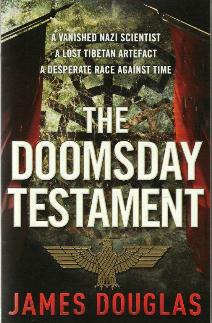
The lunatic theories of the Nazis and the Ahnenerbe, the in-house archaeology department of the SS, have been used in many a thriller and will, no doubt, continue to be as long as the truth remains stranger, more bizarre and downright evil than fiction. By no means the last, but the latest, is The Doomsday Testament from Transworld this month, by ‘James Douglas’, the pen-name of Scot Douglas Jackson who is better known for his historical novels set in Ancient Rome.
More specifically, The Doomsday Testament involves Heinrich Himmler’s attempts to turn Wewelsburg Castle in northern Germany into the spiritual home of and a shrine to the SS. For many years after World War II Wewelsburg Castle functioned as a Youth Hostel and a conference centre for students of Esperanto, and in 2010 the German government mounted an exhibition there on the history of the SS. Its notorious connections with Himmler and the bonkers ideology of the Nazis has, of course, been ably covered in fiction by James Twining in Black Sun in 2006 and over thirty years ago by Duncan Kyle in Black Camelot.
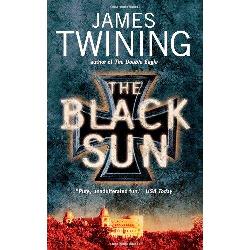 
|
|
A Pleasant Diversion
It is well known that in the month of August I usually retire to the orchards and vineyards of Ripster Hall to concentrate on bottling fruit, drinking Grenache Rose and, of course, catching up on my reading.
This year, however, I was diverted from my routine and tempted to travel up to London, despite the riotous assemblies taking place on the streets there, in order to meet with Canadian crime connoisseur and award-winning ‘blogger’ (possibly misheard) Jim Napier whose site www.deadlydiversions.com is well worth a visit.
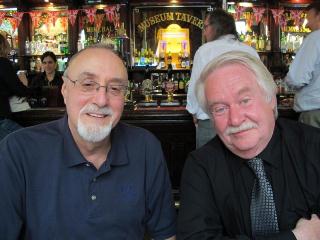
The charming Mr Napier was en route to a crime conference in Oxford, which for legal reasons I could not attend, but I managed to drag him away from the rioting crowds into a nearby hostelry near my London pied-à-terre which is known as the British Museum when open to the public. Later I even persuaded Jim and his even more charming wife Roya to join me in my West End club, the location of which remains a closely guarded secret.
|
|
Toodles!
The Ripster
|
|